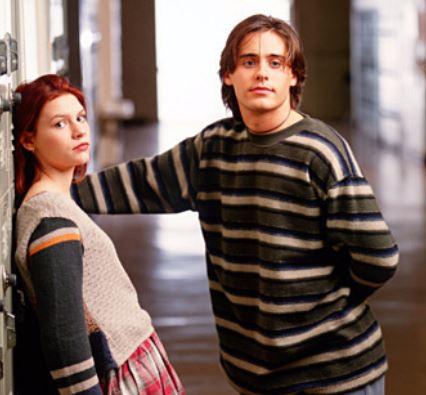
Why so sad, Angela? Jordan was hot! (Credit: Wikimedia Commons)
Ah, the teenage years. That time of unbridled emotional agony, nauseating anxiety about the future, debilitating social pressures and vomit-inducing first-love disasters, all impounded by wild hormones, horrifying acne and parents who just. don't. get. it.
We got to thinking about this truly disturbing life period when we learned that this week marks the 20th anniversary of perhaps the greatest teen-angst show ever, My So-Called Life (which incidentally means the show itself has just exited the teen years). Why is being a teenager so torturous? What's with all the eye-rolling and bed-flopping? And why won't those teens next door turn down that damn music already?!
To help answer these questions and more, we bring you this glimpse into the neurobiology of teen-dom. Get ready for some serious tumult.
Thanks for Nothing, Prefrontal Cortex!
Simply put, the prefrontal cortex controls emotions and impulses doled out by the awesomely named hippocampus and amygdala. In teens, the emotional stuff ramps up before the prefrontal cortex has fully kicked in to regulate all them feelings. Hence, depression is rampant — among those between the ages of 15 and 19, suicide is the third leasing cause of death — and a simply crappy situation can lead to doomsday-level reactions. As one researcher has put it, when teens get down, they "experience sadness untethered." Yikes!
The Dopamine Bind
Adolescents have a lower baseline level of dopamine, the neurotransmitter that provides pleasure—which explains why teens are so incredibly, annoyingly bored all the time. (Especially at family dinners and stuff. Eye roll.) At the same time, when dopamine is released in young people, it creates a more powerful feeling of euphoria, which leads to a craving for risky behavior. What'd teens ever do to you, dopamine?
The "Use It Or Lose It" Developing Mind
Between the age of 11 or 12 and the mid-20s, the brain undergoes a process called "myelination,” during which it basically figures out which of the billions of neurons created in childhood are keepers, and which should be given the boot—a process sometimes described as "use it or lose it." This makes teens super-susceptible to outside forces, which helps explain why . . .
The Teen Brain Is More Prone To Pot Addiction
Alas, new research reveals that not only are teens more likely to become addicted to cannabis than adults, but that they're more likely to use it as a gateway drug for harder stuff. Sorry, stoner teens, but your parents are right. Put away that bong and hit the books!
The Downside Of Abstract Thought: Social Anxiety
Why do teens worry so much about being popular and having lots of friends? Surprisingly, because they're learning how to think abstractly. The ability to think this way enables teens, for the first time, to consider themselves through the eyes of others—which as it turns out is a pretty shitty ability that causes incidents like cafeteria seating freak-outs and outfit meltdowns.
So yeah, being a teenager pretty much sucks. The good news is, it only lasts for a few years . . . that is, until you become a parent and have to deal with one. Shudder.






